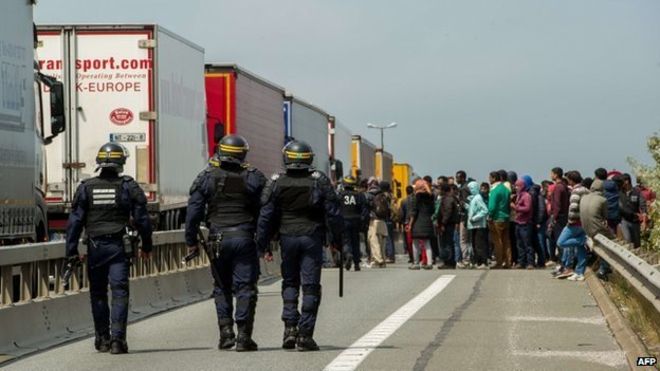This week migrants from outside of the EU have been trying to breach the EuroTunnel defences at Calais, hoping to enter the UK. France have made attempts to boost security forces along the motorway leading to the tunnel, but this has not dented the desperation of the Britain-bound migrants. With around 2000 migrants a night attempting to board lorries or make their way onto the EuroTunnel trains, it is of little surprise that these attempts are becoming more daring and more dangerous in a bid to outdo the police and make it across the channel. This was poignantly reflected on Tuesday, when a Sudanese man was killed in this process.
However in the United Kingdom, anti-immigration sentiment is running high, and there is little appetite to make space for those with eyes for British destinations. In the 2015 election, UKIP – a right wing party, offering strict controls on immigration, made major inroads with the English Electorate winning 3.9 million votes. This has been a significant headache for Prime Minister David Cameron who, in an attempt to win back these voters, has also made promises about tightening up the UK’s borders.
Immigration from outside of the EU is an increasingly pressing issue within other European countries, with countries such as Greece and Italy being the focus for people smugglers transporting people from North Africa across the Mediterranean to South Europe. These migrants often then go on to destinations such as Germany and France where the standard of living is perceived to be much higher.
There is much talk over potential solutions to this issue, many of which involve flooding more money into border control. But little focus on the origin of the problem – which was, arguably, perpetuated by European nations.
From the late 1800s, European Powers looked at Africa and the Middle East as a means of expanding their empires. The Great Powers of the time (Britain, France, Belgium, Germany, Portugal, Spain), drew up spheres of influence across the continents, showing little regard to the pre-established religious or cultural differences that had organically developed before colonisation. In many ways, this could be seen as the root cause of instability in certain states. This instability, stemming back from the actions of Europeans, is partially to blame for the generation of the conflict, poor living conditions and failed states we see today.
It could also be argued that Western ‘Neoliberalism’ is at fault for generating inequality. Indebted nations, especially in Africa have looked to Western development banks such as the International Monetary Fund and the World Bank for debt relief. The money came, but often with add-ons. For example, neoliberal austerity and free market measures – born out of the “New Right” and pushed by prominent figures such as Margaret Thatcher and Ronald Reagan in the 1980s – were enforced in countries receiving these debt payments. However, these schemes often ruined developing nations from becoming competitive, by slashing government subsidies to key sectors such as agriculture and manufacturing.
The debt packages also encouraged some governments, such as that of Tanzania, to privatise public sector services, such as water provision. The introduction of market forces and market prices that ensued left many poor Tanzanian’s unable to access water as the price of this key commodity soared.
Although it is not accurate to blame European states for all of the downfalls and problems in Africa and the Middle East, such as corruption, dictatorial rulers and unrest, the role of Europe in the history of these regions does have to be closely considered. As long as inequality remains between Europe, Africa and the Middle East, the migrants will keep on coming. History, as ever, is key to understanding the issues we face today.

Living in the UK all my life I have little to no idea what must go through these migrants heads but I can believe that they wish to risk it all for a better life. I mean, can we blame them? The Uk is a haven that looks out for the needy with benefits, NHS, pensions, its everyone’s dream if you do not already have it!
I totally agree with you that the inequality throughout the world is forcing people to make drastic decisions to try and better their lives, any one would try to do that we cannot blame them. However, there will eventually be a event horizon where the infrastructure of the UK cannot support such a large population and it will crumble for all. The UK needs people who are skilled, active and willing to contribute to society rather than sponge on all the benefits. It is not a case of being prejudiced against foreigners, but being smart so that a leading superpower doesn’t have its infrastructure destroyed.
HAHA, good read, you got me all pumped up
LikeLiked by 1 person
Thanks for reading Jack. It’s true there is only so many migrants that the UK can take. This article was aimed at giving some historical context to the events we see today. #GlobeAnalysis
LikeLike
Do you have a personal opinion about the immigration?
LikeLiked by 1 person
I do. I feel that as an EU member the UK should shoulder its fair share of migrants. Similar to yourself however, I do agree this can only be done to a certain extent. Until the EU formulates a proper strategy to provide a coherent future for these migrants, the situation in Calais is likely to remain unchanged.
LikeLike
Hi Sam, thought I should check out your blog as you read mine earlier today and I’m glad I did. An interesting read, nicely thought out
LikeLiked by 1 person
Thanks Rich, the feedback is much appreciated.
LikeLiked by 1 person